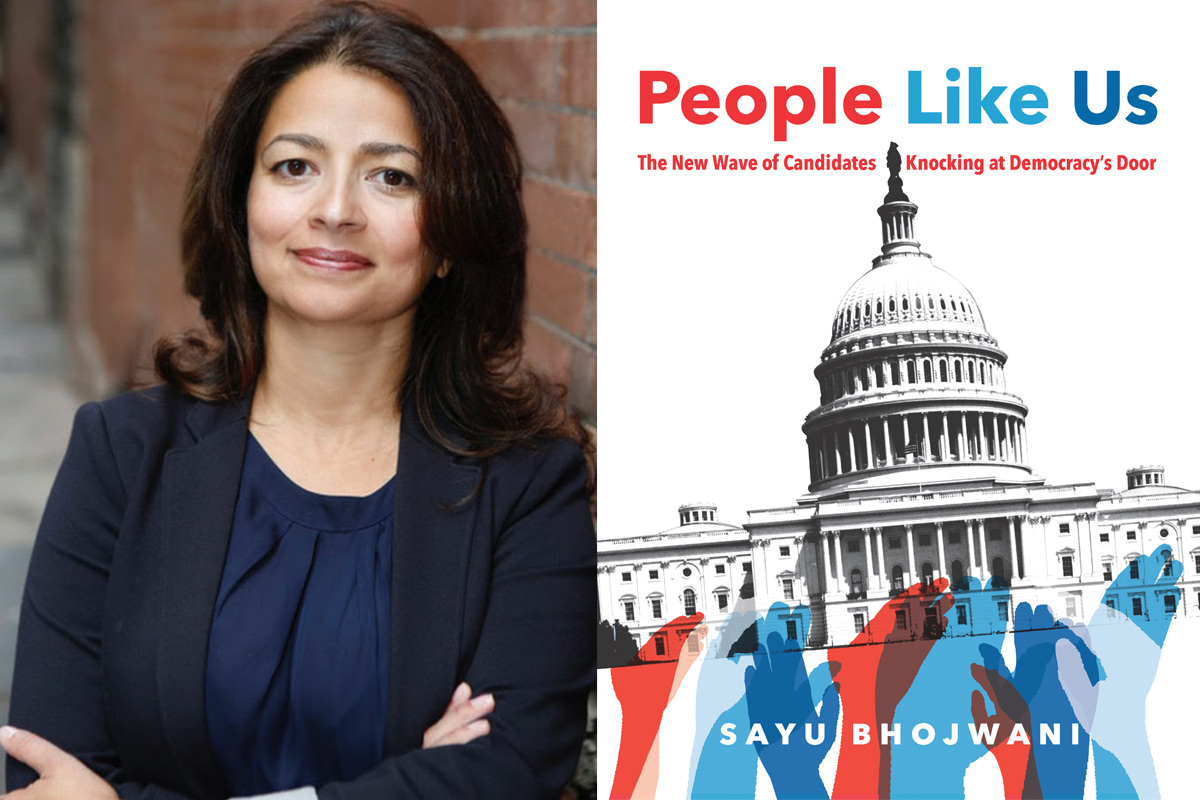These are heady days for Sayu Bhojwani.
Her book, People Like Us: The New Wave of Candidates Knocking at Democracy’s Door (The New Press) is hitting stores this week. On Election Day (Tuesday, November 6th), the names of some 50 candidates recruited and trained by New American Leaders (NAL), the nonprofit that Bhojwani (Ph.D. ’14) founded nearly a decade ago, will appear on ballots across the country. At a moment when the climate for immigrants in the United States is decidedly mixed, all are either first- or second-generation Americans.
Bhojwani, who likes to say that she was born in the world’s largest democracy (India), raised in perhaps its smallest (Belize) and now lives in its greatest (the United States), can pinpoint the exact moment when she came up with the idea for NAL. She knows it began after college, when, finding herself in a series of unsatisfying jobs, she realized – as she put it in a September 2016 TED Talk – that “the door I thought was open was just slightly ajar” and “could slam in your face if you had the wrong religion, immigration status and skin color.
The idea took on greater urgency in 2008, after Congress had failed to pass immigration reform and create a pathway to citizenship for millions of undocumented migrants. And it became more urgent still in 2010, when Arizona passed its “show us your papers” law allowing police to stop drivers they suspected of being unauthorized immigrants.
By then, it was clear to Bhojwani – who in 2002 had become New York City’s first-ever commissioner of immigrant affairs – that waiting for the entrenched political establishment to protect the rights of newer Americans was not a reliable strategy. She decided it was time for leaders of immigrant communities to run for office – and win. And she set about developing a training curriculum that is both bold and fundamentally simple: Own your story, bring your community into the democratic process, and see fundraising as an investment in your vision for your community, rather than just in yourself.”
We’re really talking about a whole different way of doing business – the business of democracy.”
—Sayu Bhojwani
Over the past eight years, NAL has used that approach to train more than 600 candidates in eight states – a list that includes New York’s Catalina Cruz, poised to become the state’s first formerly undocumented immigrant to join the state’s lower house, and Stephanie Chang, the first Asian-American woman elected to Michigan’s state house.
“In general, progressives and party leaders have failed to invest in recruiting and supporting immigrant candidates to run and win in any election, rather than in just those contests in which the racial composition of the district is considered favorable to a particular racial minority,” Bhojwani writes in People Like Us. “This exacerbates the political quandary facing our nation: outsiders want to change the status quo, and insiders need things to stay the same.” In fact, she points out, U.S. Congress remains 81 percent white and male, even as the proportion of foreign-born Americans has grown to the highest level in a century.
Bhojwani’s book is partly an outgrowth of her work at Teachers College, where she returned for her third stint as a student in 2014 – after her groundbreaking tenure at City Hall – and earned her Ph.D. with a focus on politics and education, writing her thesis on immigrants and electoral politics. Her goals may have changed from her first arrival on the Teachers College campus in the late 1980s – when she earned a masters’ degree geared toward teaching high school English – but Bhojwani says her focus has always been teaching others.
“As a kid, I wanted to be a teacher and in some ways I’ve managed to maintain that through life,” Bhojwani said. A native of India, she grew up in an ex-pat community in Belize. Her comfort with New York City’s diversity – and America’s imperfect ways of addressing inclusion – led her to stay in the city, where she founded an organization called South Asian Youth Action in 1997.
Now, Bhojwani finds herself riding a political wave that likely will only get bigger in the years to come. NAL plans to expand into two additional states – Georgia and Colorado – in 2019, but Bhojwani is digging in for a much longer haul. “We’re really talking about a whole different way of doing business – the business of democracy,” she said, “and I think that is going to take some time.”
